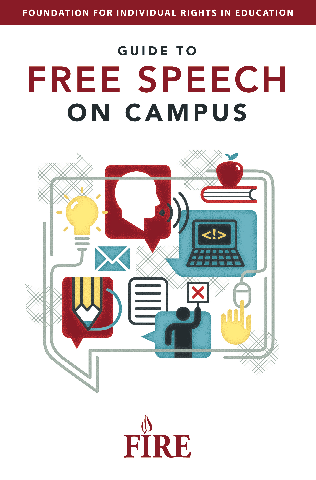

One of the absolute best parts of my job is having the opportunity to talk about the First Amendment and free speech to students, faculty members, and university administrators across the country. To me, there's nothing more satisfying than educating folks about the importance of freedom of expression on campus. And after giving these talks for the past several years, I've found that each audience has its own specific interests: faculty want to hear about academic freedom, administrators want to know how best to address student conduct concerns without censoring students or risking a civil rights lawsuit.
But for me, student audiences are the most fun of all. That's because when it comes to free speech on campus, students sometimes have the most to learn.
In my experience, faculty members are usually pretty hip to the rights they have to inquire, speak out, conduct controversial research, publish scathing critiques, and so forth. And any administrator that's been on campus for more than a year or two usually has a few stories about having to distinguish between student speech that's protected by the First Amendment (or, at private colleges, by the institution's stated commitments to free speech) and truly harassing or threatening conduct.
Students? Well, more often than not, students think they enjoy far fewer free speech rights than they actually do! That's why it's a real joy to watch wide-eyed students react when I tell them about Supreme Court cases like 1973's Papish v. Board of Curators of the University of Missouri, in which the Court held that a public university couldn't lawfully expel a student for distributing an "indecent" underground political magazine on campus. Or more recent federal court cases like Morbitzer v. University of Cincinnati, a First Amendment challenge levied against a college that threatened to call the cops on a student group that wanted to gather signatures outside of a tiny "free speech zone."
Hearing about these important legal precedents and the scope of their rights on campus, students realize that free speech isn't just some half-remembered, abstract theory about shouting "Fire!" in a crowded theater. Instead, freedom of expression comes alive as a very real, very important right, both of immediate practical use -- "Hey, let's have that protest today!" -- and of deep philosophical and moral value. Instead of simply silencing views we'd rather not hear, our First Amendment means that we have committed ourselves to answering ideas with still more ideas, of countering what Justice Louis Brandeis deemed "evil counsels" with "good ones." In other words, free speech means that we believe in ourselves to ensure that the truth will out.
I always receive a lot of great questions from student audiences: What are the limits to free speech? What should I do if I've been punished for saying or publishing something that other people didn't like? Can I get in trouble for Facebook or Twitter posts?
If you're a student, and you're reading this right now (thanks!), you may be asking these very same questions. Because I'm unfortunately going to be unable to get to every college campus this upcoming year, I'm extremely pleased to announce the publication of the Foundation for Individual Rights in Education's newly updated Guide to Free Speech on Campus.
FIRE is a nonpartisan nonprofit organization dedicated to defending student and faculty rights (I'm FIRE's Director of Legal and Public Advocacy), and our new Guide has the answers to all of these questions and much, much more. Students can receive a free hard copy by contacting FIRE, or you can download a free iBook or PDF version of the Guide now from our website or on Facebook. Check out our new Guide and educate yourself about your right to speak your mind on campus!
